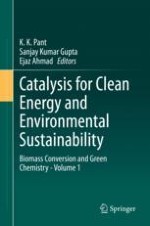2021 | OriginalPaper | Buchkapitel
Sustainability of the Catalytic Process for Biomass Conversion: Recent Trends and Future Prospects
verfasst von : Rohidas Bhoi, Virendra Kumar Saharan, Suja George, Sonal
Erschienen in: Catalysis for Clean Energy and Environmental Sustainability
Aktivieren Sie unsere intelligente Suche, um passende Fachinhalte oder Patente zu finden.
Wählen Sie Textabschnitte aus um mit Künstlicher Intelligenz passenden Patente zu finden. powered by
Markieren Sie Textabschnitte, um KI-gestützt weitere passende Inhalte zu finden. powered by
